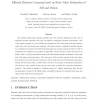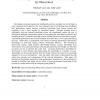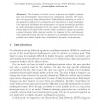171 search results - page 3 / 35 » Hierarchical Behavior Knowledge Space |
AR
2008
13 years 5 months ago
2008
The existing reinforcement learning methods have been seriously suffering from the curse of dimension problem especially when they are applied to multiagent dynamic environments. ...
ICASSP
2008
IEEE
14 years 6 days ago
2008
IEEE
While the ”‘quasi-state-of-the-art”’ towards acoustic emotion recognition relies on multivariate time-series analysis of e.g. pitch, energy, or MFCC by statistical functio...
ICML
1999
IEEE
13 years 10 months ago
1999
IEEE
Developing automated agents that intelligently perform complex real world tasks is time consuming and expensive. The most expensive part of developing these intelligent task perfo...
ROBOCUP
2005
Springer
13 years 11 months ago
2005
Springer
The domain of robotic soccer is known as a highly dynamic and non-deterministic environment for multiagent research. We introduce an approach using Hierarchical Task Network planni...
IICAI
2007
13 years 7 months ago
2007
Structured Hidden Markov Models (S-HMM) are a variant of Hierarchical Hidden Markov Models; it provides an abstraction mechanism allowing a high level symbolic description of the k...



